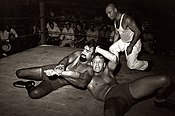
Back بريت هارت Arabic بريت هارت ARZ Брет Харт Bulgarian ব্রেট হার্ট Bengali/Bangla Bret Hart Catalan برێت ھارت CKB Bret Hart Czech Bret Hart Danish Bret Hart German Μπρετ Χαρτ Greek
| Bret Hart | |
|---|---|
 Hart in 2023 | |
| Birth name | Bret Sergeant Hart[1][2] |
| Born | July 2, 1957 Calgary, Alberta, Canada[3] |
| Alma mater | Mount Royal College[4] |
| Spouse(s) |
|
| Children | 4 |
| Relatives | Harry Smith (maternal grandfather)[5] |
| Family | Hart |
| Website | brethart |
| Professional wrestling career | |
| Ring name(s) | Bret Hart[3] Buddy Hart[3] |
| Billed height | 6 ft 0 in (183 cm)[6] |
| Billed weight | 235 lb (107 kg)[6] |
| Billed from | Calgary, Alberta, Canada |
| Trained by | Stu Hart[3][a] Katsuji Adachi[3] Kazuo Sakurada[9] |
| Debut | March 29, 1978[10] |
| Retired | September 12, 2011[11][b] |
| Signature | |
 | |
| Part of a series on |
| Professional wrestling |
|---|
 |
Bret Sergeant Hart (born July 2, 1957) is a Canadian-American retired professional wrestler. A member of the Hart wrestling family and a second-generation wrestler, he has an amateur wrestling background at Ernest Manning High School and Mount Royal College. A major international draw within professional wrestling, he is credited with changing the perception of mainstream North American professional wrestling in the early 1990s by bringing technical wrestling to the fore. He is widely regarded as one of the greatest professional wrestlers of all time; Sky Sports noted that his legacy is that of "one of, if not the greatest, to have ever graced the squared circle". For the majority of his career, he used the nickname "The Hitman".
Hart joined his father Stu Hart's promotion Stampede Wrestling in 1976 as a referee and made his in-ring debut in 1978. He gained championship success during the 1980s and 1990s in the World Wrestling Federation (WWF, now WWE), where he helmed The Hart Foundation stable. He left for World Championship Wrestling (WCW) following the controversial "Montreal Screwjob" in November 1997, where he remained until October 2000. Having been inactive from in-ring competition since January 2000, owing to a December 1999 concussion, he officially retired in October 2000, shortly after his departure from the company. He returned to sporadic in-ring competition from 2010 to 2011 with WWE, where he won his final championship, headlined the 2010 SummerSlam event, and served as the general manager of Raw. Throughout his career, He headlined WrestleMania IX, X, and XII, and participated in the main event of Starrcade 1997 and 1999 – as a special enforcer and referee in the former.[c] He was inducted into the Wrestling Observer Newsletter Hall of Fame upon its inception in 1996, while still an active performer.
Hart held championship titles in five decades from the 1970s to the 2010s, 32 throughout his career and 17 between the WWF/WWE and WCW. Among other accolades, he is a five-time WWF Champion and a two-time WCW World Heavyweight Champion. He went the most combined days as WWF Champion during the 1990s (654) and was the first WCW World Heavyweight Champion born outside the United States. He is the second WWF Triple Crown Champion and fifth (with Goldberg) WCW Triple Crown Champion, and the first man to win both the WWF and WCW Triple Crown Championships. He is also the 1994 Royal Rumble match winner (with Lex Luger), and the only two-time King of the Ring, winning the 1991 tournament and the first King of the Ring pay-per-view in 1993. Stone Cold Steve Austin, with whom he headlined multiple pay-per-view events as part of an acclaimed rivalry from 1996 to 1997, inducted him into the WWE Hall of Fame class of 2006. In 2019, he became one of seven people to enter the WWE Hall of Fame twice, when he was inducted again as a member of The Hart Foundation, with brother-in-law Jim Neidhart.
Outside of wrestling, Hart has appeared in numerous films and television shows such as The Simpsons as well as featuring in several documentaries, both about himself specifically and others about his family or the wrestling industry in general. He also helped found and lent his name to the major junior ice hockey team the Calgary Hitmen and has written two biographies along with a weekly column for the Calgary Sun for over a decade. After his retirement, he spent much of his time on charitable efforts concerning stroke recovery and cancer awareness, due to his experiences with the two.
- ^ Historical Dictionary of Wrestling. Scarecrow Press, inc. 2014. p. 129. ISBN 978-0-8108-7926-3.
- ^ Hart, Diana; McLellan, Kirstie (2001). Under the Mat: Inside Wrestling's Greatest Family. Fenn. p. 22. ISBN 1-55168-256-7.
- ^ a b c d e "Bret Hart profile". Online World of Wrestling. Retrieved July 30, 2008.
- ^ "Bret 'Hitman' Hart honoured with MRU degree — 40 years after he dropped out". Calgary Sun. May 31, 2018.
- ^ "Exhibiting our pride". Slam! Sports. Canadian Online Explorer. January 23, 2000. Archived from the original on December 22, 2015.
- ^ a b "WWE Hall of Fame: Bret Hart". WWE. Retrieved September 15, 2015.
- ^ (Hart 2007)
- ^ "Exclusive interview: Bret Hart separates fact from fiction on who really trained in Stu Hart's Dungeon".
- ^ (Hart 2007, p. 37)
- ^ (Hart 2007, pp. 35–41)
- ^ "Bret Hart retires". Slam Canoe. October 27, 2000. Archived from the original on July 22, 2017.
- ^ Reynolds, R. D.; Alvarez, Bryan (October 2014). Death of WCW, The: 10th Anniversary Edition of the Bestselling Classic – Revised and Expanded. ECW Press. ISBN 9781770906426.
Cite error: There are <ref group=lower-alpha> tags or {{efn}} templates on this page, but the references will not show without a {{reflist|group=lower-alpha}} template or {{notelist}} template (see the help page).